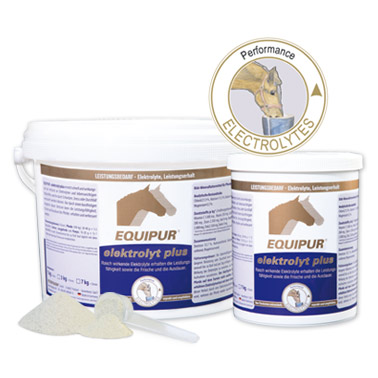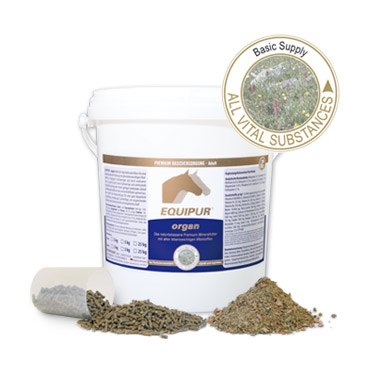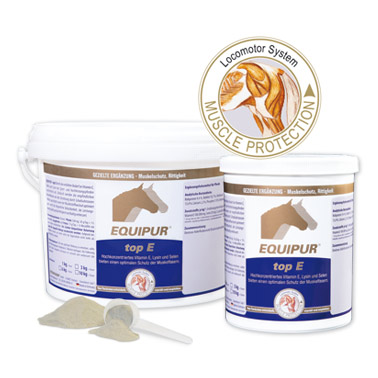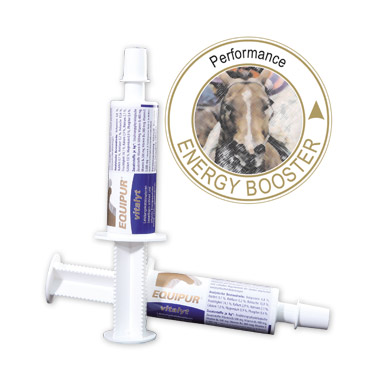
EQUIPUR - elektrolyt plus
Dietetic mineral feed for horses
Maintains efficiency, provides freshness and stamina by readily effective electrolytes.
| 1 kg | Can | Powder |
| 3 kg | Bucket | Powder |
| 7 kg | Bucket | Powder |
| 25 kg | Bucket | Powder |
Dietetic mineral feed for horses
Maintains efficiency, provides freshness and stamina by readily effective electrolytes.
Product Details
Application
Analytical constituents
Feed additives per kg
Composition
Instructions for proper use
Feeding period
General findings of nutritional science
Application
EQUIPUR - elektrolyt plus quickly and effectively replaces the loss of electrolytes and essential vital substances, which could be caused by perspiration, stress or the effects of diarrhoea. Only by a short-term replacement of these losses can the performance capacity, the freshness and stamina of the horse be restored or improved.
Analytical constituents
| Chloride | 21,9 % | |
| Sodium | 11,5 % | |
| Potassium | 4,5 % | |
| Calcium | 1,6 % | |
| Magnesium | 0,3 % | |
| Phosphorus | 0,1 % |
Feed additives per kg
| Nutritional additives | ||
| Niacin | 250 mg | |
| Calcium-D-pantothenate | 200 mg | |
| Iron | 2.500 mg | |
| Iodine | 8 mg | |
| Copper | 375 mg | |
| Manganese | 2.000 mg | |
| Zinc | 2.500 mg | |
| Selenium | 5 mg |
3b103 ferrous-(II)-sulphate monohydrate, 3b201 potassium iodide, 3b405 cupric-(II)-sulphate pentahydrate, 3b503 manganous-(II)-sulphate monohydrate, 3b603 zinc oxide, 3b801 sodium selenite.
Composition
Dextrose, sodium chloride, potassium chloride, calcium carbonate, magnesium oxide.
Instructions for proper use
Horses (500 kg): 20 - 40 g
Foals, young horses and ponies: 10 - 20 g
given with the feed.
Should be given 1 to 3 days after heavy sweating or diarrhoea depending on the electrolyte loss up to five times a day.
Due to the increased content of trace elements daily ration should not exceed 200 g for horses (500 kg) and 100 g for foals, young horses or small horses.
Water must be available for at least 20 minutes or preferably for one hour after administration.
During this period, the fluid intake should be checked; in case of insufficient water intake, the advice of a veterinarian should be sought.
Feeding period
In cases of heavy sweating, prolonged exertion or diarrhoea, feeding the horse electrolytes up to five times per day does not pose a problem. For optimum effect of the electrolytes, water should be provided at all times. The most frequent reason why horses do not drink during tournaments is the excessive high loss of electrolytes with sweat. Only if this loss has been compensated with an electrolyte, the horses will again drink enough water!
Responsible for the labelling:Vetripharm GmbH, Gewerbestraße Süd 7, D-86857 Hurlach
Approval number: α DE-BY-1-00006
Corresponding declaration concerning minimum storage life and lot reference number can be found on packaging.
According to the anti-doping and medication control rules of the “Deutsche Reiterliche Vereinigung (FN)“, application of this product during competition is allowed (ADMR conform).
General findings of nutritional science
The performance capacity and stamina of the horse depends upon a well regulated electrolyte and fluid balance. During intensive work and/or at high ambient temperatures, a horse can lose 15 - 20 litres of sweat within a few hours.
The sweat-loss causes loss of fluid and, especially a marked deficiency of electrolytes (up to 50 g sodium, 75 g chloride and 25 g potassium). Quantity elements such as calcium, magnesium and trace elements are exuded. If such losses are not compensated, the result is a crucial breakdown in performance, accompanied by exhaustion and increased proneness of the musculature to tension, spasm, tying-up, and lumbago.
Sodium and chloride regulate the water and electrolyte balance, and maintain tissue elasticity outside the cells. Many basic feeds have a reduced sodium content, thus leading to a horse‘s loss of appetite, loss of weight and poor performance.
Potassium is indispensable for maintaining the performance potential of the muscle cells. Deficient supply results in functional disorders of heart and skeletal musculature.
Calcium and magnesium form the basis of effective and coordinated muscular work and are particularly necessary for energy metabolism and for transmission of nerve impulses in the muscle cells. A deficiency manifests itself in the form of irritability, muscular twitching and muscular cramps.

Service phone
Freecall: 0800 / VETRIPHARM
Telefon: 0 82 48 / 888 88 - 0





